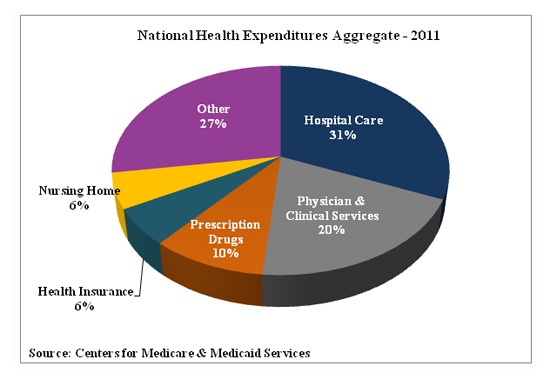The Affordable Care Act (ACA), or Obamacare, focuses on the access to health insurance which does not necessarily mean affordable medical care for average Americans. The fundamental issue with our health care system is the cost that makes it unaffordable for average Americans. That is why I propose an incentive system that I call "Smart Patient Credits (SPC)," which will not require any legislation, just a smarter application of free-market principles. It would work something like a credit-card rewards program -- except that the rewards would accrue from spending less rather than more.
The federal government's recent decision to publish Medicare data on hospital charges was long-overdue. It was the right step to take if the U.S. is ever to have a hope of bringing skyrocketing health-care costs back to Earth. Without more widespread price transparency, consumers can't play their crucial free-market role in choosing reasonable prices or in assessing quality and value. Thus health-care costs will continue to rise.
Providing consumers with basic price information is just common-sense capitalism. However, after decades of chronic, institutionalized ignorance, consumers will need more than just clearly marked price tags to take up the kind of active role they typically play, and should play, when shopping for all kinds of goods or services.
SPCs would work this way: Insurance companies will provide to their subscribers the maximum dollar amounts they have agreed to pay to their healthcare providers for standard procedures and treatments. Moreover, they will require those providers, such as hospitals and doctors, to publish their list prices. If patients can get the service they want for less than the contracted price, they would receive SPCs for every dollar of savings -- 50 cents on the dollar, for example. So if a patient chooses a provider who charges $1,000 less than the maximum amount his or her insurer will pay, then he or she would receive $500 worth of SPCs from his or her insurer or Medicare, which could be applied to a co-payment or other uncovered medical expenses.
The recent experience of the California Public Employees' Retirement System (CalPERS) shows the benefits of empowering the consumers. When its Anthem Blue Cross members were told it would cap its payments for a knee or hip replacement surgery at $30,000, some patients shopped around for hospitals that would fit that budget. One result was that about 40 higher-priced hospitals in California cut their surgery prices significantly to avoid losing patients, while some patients simply chose less expensive hospitals. The average charge among the more-expensive hospitals fell 37% from $43,308 in 2010 to $27,149 last year for these common joint replacements. It resulted in savings of $5.5 million to CalPERS over a two year period.
This new structure would give consumers a needed incentive to shop, evaluate and decide which medical provider is best for them. By employing such incentives as SPCs, private insurers and Medicare would benefit by having millions of their policyholders serve, in effect, as their auditors and cost controllers.
There are of course other factors besides price to consider, as any consumer would, such as quality of care. And there are certainly situations, such as emergency treatments, where it may be impossible to know the costs up front. But for doctor's office visits, flu shots, and standard, well-established elective procedures such as gall bladder removal and knee replacements -- a price or at least a price range should be a given, as it would be in any business. Doctors and hospitals are businesses after all, and account for 50 percent of our health care cost (see chart below). Besides, what kind of business either doesn't know or won't tell you what it charges for standard goods or services? I ask this as a small business owner myself.
The difference between what Medicare or private insurers will pay for procedures and what hospitals and doctors actually charge also contributes to the driving up of prices because these costs must somehow be absorbed. This is just another reason why it's time to think outside the box to bring sanity to our health care quagmire. With an approach like Smart Patient Credits we can bring missing free-market forces to bear that will bring greater efficiency out of our health care delivery system and reverse the untenable rise in costs that threatens to put affordable care hopelessly out of reach -- with or without the Affordable Care Act.

